By Tsering Thillman and Liz Stanislawski
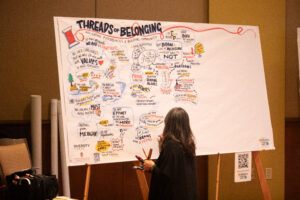
The University of Wisconsin–Madison’s Division of Diversity, Equity & Educational Achievement (DDEEA) hosted its 2024 Diversity Forum, “Threads of Belonging: Navigating Differences and Building Community,” on November 13-14 at Union South. The annual event brings together a dynamic cross-section of students, faculty, staff, and global participants to explore contemporary issues related to creating equitable and inclusive learning and working environments. For more than 20 years, Diversity Forum has served as an important space for fostering dialogue on how embracing differences creates a strong sense of belonging in our communities. Over the course of two days, the forum offered a rich array of powerful keynotes, thought-provoking panels, interactive audience discussion, and collaborative breakout sessions.
Attendance and Virtual Reach
Nearly 750 people attended the forum in person this year, while another 1,700 participated virtually, including attendees from Canada, Switzerland, and China. Online video streams exceeded 12,000 views.
Opening Remarks
Opening the event, Dr. LaVar J. Charleston, vice chancellor for inclusive excellence and director of the DDEEA, emphasized the importance of leaning into pluralism.
“In this current climate, where divisions seem more pronounced than ever, we must engage across differences–whether political, cultural, geographical, religious, or racial–to facilitate important innovations,” he stated. Dr. Charleston highlighted that this year’s Diversity Forum provided an excellent opportunity for attendees to embrace dialogue that spans a spectrum of views. He underscored that a plurality of data-informed ideas leads us to solutions to address the world’s most challenging problems.
Echoing this sentiment was UW–Madison’s Chancellor Jennifer L. Mnookin. “We can, and will, and absolutely must continue to be a place of opportunity and discovery, rooted in our diversity, our commitments to inclusive excellence, commitments to one another, and our commitments to innovating for the public good,” she affirmed.
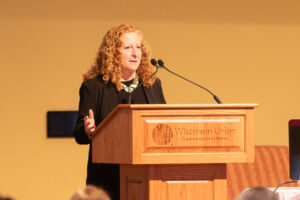
Our Shared Future
UW–Madison’s Director of Tribal Relations and a member of the Oneida Nation, Carla Vigue, provided updates on the strategic efforts, relationships, and initiatives supporting indigenous communities and Our Shared Future. She shared stories from her childhood, reflecting on the elders and leaders in her community who inspired her and taught her the meaning of service.
She emphasized the “Seventh Generation” philosophy, a principle that encourages us to consider how today’s decisions will affect the next seven generations. Director Vigue posed a reflective question to the audience, “Think…do our actions, do our deeds, benefit not just ourselves, our children, and our community right now, but do they [also] benefit the next seven generations? And ask yourself…what more can be done?”
Keynote Speakers
Day One featured keynote speaker, author, and entrepreneur Dr. Steve L. Robbins, an expert in cognitive neuroscience. Dr. Robbins presented an engaging and interactive address “Your Brain is Good at Inclusion…Except When It’s Not,” blending humor and insight into his science-based approach, and leveraging neuroscience to explore how human behavior shapes inclusion and exclusion. Dr. Robbins emphasized that the brain’s primal tendency to categorize others is rooted in our deep need to belong. To demonstrate the brain’s unconscious processes, Dr. Robbins guided the audience through various mind-bending exercises that illuminated how instincts impact our actions in who we include and exclude in our social circles.
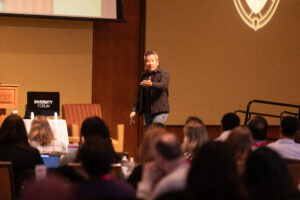
On Day Two, Fanshen Cox, a talented playwright, performer, educator, and producer, captivated the audience with her interactive keynote, “Tell Your Story, Change the World,” emphasizing storytelling as a tool for systemic change and fostering a sense of belonging. Cox encouraged the audience to connect their personal stories with the collective experience, highlighting the power of listening and understanding each other’s narratives.
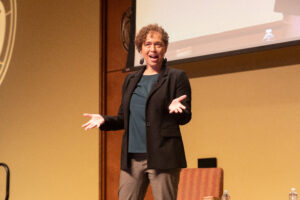
Anniversary Celebration and Recognition
During the forum, the DDEEA announced it was celebrating its 15th anniversary, recognizing a decade and a half of powering the work of community, access, and belonging on campus and beyond. To mark the milestone, the division hosted a reception after Day One, featuring posters on easels that showcased some of DDEEA’s key accomplishments since its founding in 2009.
Dr. Charleston also presented the inaugural “Damon A. Williams Trailblazing Change Agent Award” to Dr. Williams, who established the DDEEA in 2009, becoming UW–Madison’s first chief diversity officer.
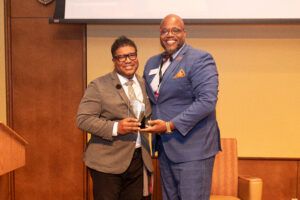
During his acceptance speech, Dr. Williams stated, “I believe when we accomplish great things, it’s never just about us. True greatness lies in what we bring to others: the love, the light, the hope, the possibility, how we inspire something in their lives. The most remarkable achievements, like what brings us here today to celebrate the DDEEA, and most importantly, this emboldened sense of possibility that is in Badger Nation is always pursued together, and is always pursued in community.”
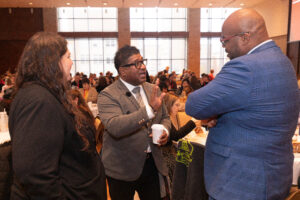
Plenary Sessions
The forum also featured two plenary sessions. The first, “Antisemitism, Democracy, and the Struggle for an Inclusive and Resilient America” focused on the vital connection between combating antisemitism and safeguarding democratic values. Panelists emphasized that “a healthy democracy requires civil solidarity,” stressing the importance of unity in the face of hate. The second session, “What Does Diversity Science Say About Belonging & Community?” provided research-backed solutions to complex social issues, offering insights on how to foster belonging and community across workplaces, mental health systems, and online platforms. Led by UW–Madison’s faculty experts in diversity science, the session highlighted that it takes approximately nine hours to become culturally responsive and that engaging in this process collectively proves more effective than doing it alone.
Breakout Sessions
Participants attended breakout sessions addressing a variety of topics from mental health needs of underrepresented students, plain language utilization for inclusive excellence, and an insider look on the PBS series, “Why Race Matters: Being Black in Wisconsin.”
Other highly attended sessions included “Designing for Everyone: Leveraging User Experience Design and Digital Accessibility to Create Inclusive Experiences,” which emphasized the transition from basic usability to robust accessibility as essential for inclusion. Another standout session, “Towards Constructing Military-Connected Student Inclusion” provided valuable insights into the unique needs and identities of student veterans, service members, and their families. Attendees gained a deeper understanding on how to build inclusive working and learning environments.
To view more session recordings, visit diversityforum.wisc.edu
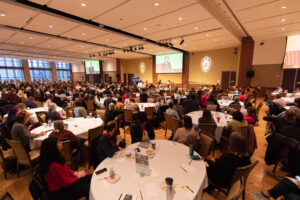
Final Takeaway & Looking Ahead
The 2024 Diversity Forum inspired the audience to take action towards creating a more inclusive future that reflects the rich tapestry of human experience. By understanding one another and making intentional efforts to navigate our differences, we can build a stronger and more connected community that values every voice.
Next year’s UW–Madison’s Diversity Forum will take place on November 18 and 19, 2025. The DDEEA will announce a call for proposals in spring/summer 2025, followed by registration for the event in fall 2025.